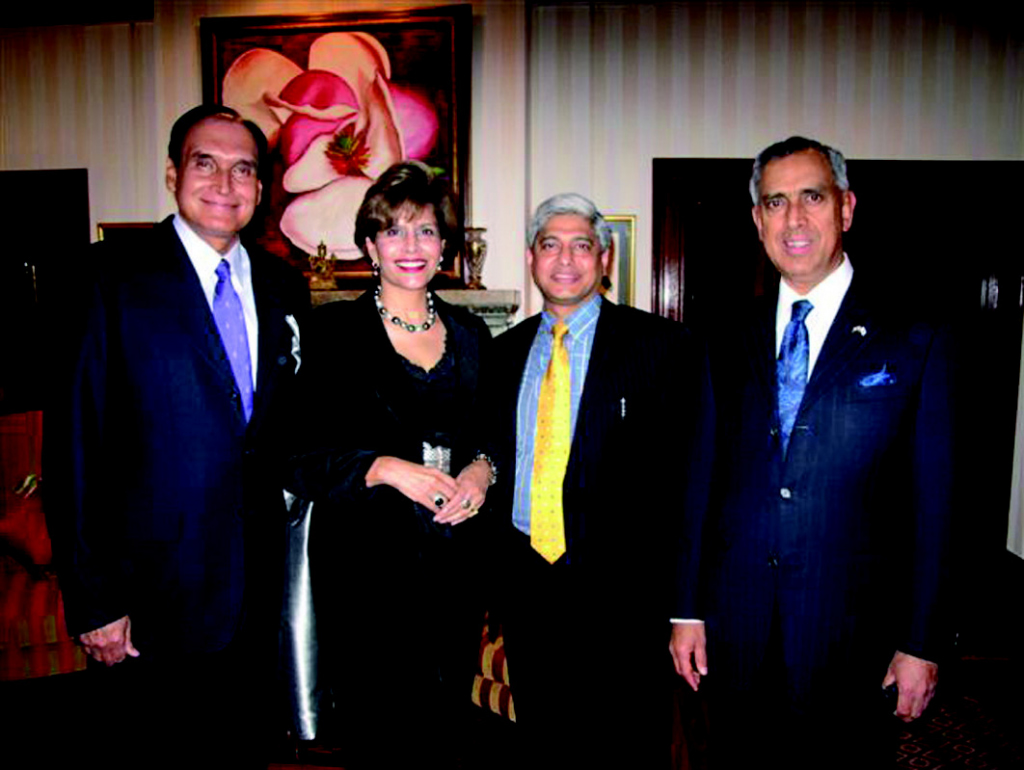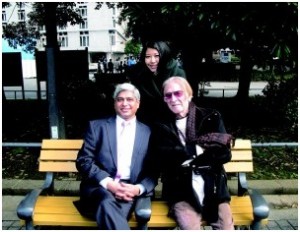Meeting Vikas Swarup, author of the original tale that inspired the award-winning film
by Ulara Nakagawa & Bill Hersey
We meet Vikas Swarup and our graceful hosts from Kodansha/Random House for lunch at the Mastumotoro Restaurant here in Tokyo, overlooking Hibiya Park on a breezy early spring afternoon. One of the first things we learn as we begin chatting with him is that Vikas really cannot wait to get a break; that is, to have a moment away from his currently hectic schedule to get back to his laptop (he can only write on screen, not paper) and work on his third novel, already in progress.
It is no surprise he has been kept busy. The enormous success and popularity of the movie Slumdog Millionaire (based on his 2005 debut novel originally entitled Q&A) surrounding the Academy Awards (of which it won eight) has set Vikas on the world stage and put him high on the list of subjects of media interest. Plus, there is the additional promotional work and interviews coinciding with the international release of his book, Meeting Vikas Swarup, author of the original tale that inspired the award-winning film SLUMDOG MILLIONAIRE that has had him traveling all over the world as of late. Not to mention his work as a diplomat, currently stationed in Pretoria as India’s Deputy High Commissioner to South Africa.
Upon hearing this, we decide to take this interview in stride, enjoying the meal and our present company, jotting down notes sparingly between courses, and planning to fact-check and insert the necessary details later. No need to make this another hectic task on Vikas’ Japan visit. Yet, we soon discover that despite his earlier comment, there is no way that Vikas Swarup could be anything but a journalist’s dream. Not only does he show a genuine interest and excitement in what we have to say, but ask him a question about the movie industry, his sons, his writing process, even his entrée, and he lights up, always responding with animation, a colorful vocabulary, and a thought-provoking opinion.
We find ourselves immediately comfortable in his presence, no airs involved, and notice that one of his catch phrases, “my god!,” is peppered throughout lunch, in reaction to any new fact that arises in conversation. (We later discuss how impressed we are with the way that he was able to remember our names, particularly ‘Ulara,’ after one introduction—the ability to retain names in the blur of a first meeting is one diplomatic skill neither of us comes close to possessing.)
We soon learn that Vikas’ enthusiasm about being in Japan at present has a very personal twist—just the night before, he had received a call from the Indian Ambassador informing him that his next three-year posting would be as consul general in Osaka, as of early this summer. Naturally, the conversation then turns to Japanese culture, and that the same distribution company that brought Slumdog Millionaire to Japan, GAGA Communications, was also responsible for one of Vikas’ all time favorite movies, Babel: “The acting blew me away.”
We delve into a deeper discussion about whether or not the film depicted real-life Japan, and should anyone have been insulted by the shockingly provocative scenes involving the deafmute character Chieko, played by Rinko Kikuchi, whom Vikas mentions he “would love to meet.” Vikas asserts that, ultimately, alienation is the central theme of the film and the extremes to which the character was portrayed are not as important as her being a metaphor for isolation and loneliness—untouched by the world and simply using sex as an outlet for her desperation, to be touched, to feel, to be seen and acknowledged by a society that can be so cold and quick to shrug off the ‘abnormal.’
Then we inevitably move into the ideas of cultural misrepresentation and exploitation in art, certain themes of controversy that arose around Slumdog Millionaire. Regarding the issue of Slumdog having been called “poverty porn” by some, for exploiting the lives and trivializing the real struggles of those living the Indian slum life, Vikas is quick to point out that it “neither trivializes or degrades…rather it is a portrait of humanity;” that the very reason it is the “first cultural success of the new depression,” the “feel-good film of the century,” is because it is ultimately, at root, a tale of hope and optimism.
Says Vikas, “People want to be inspired right now. And (the slums) are the ground zero of human survival—slums are not places of despair, the struggle to move out of the slums is a [story of hope], and hope makes life right. If this guy can make it out of the slums, anyone can—[it is] a time for the underdog.”
Also, on a grander scale talk about the India itself being a sort of global underdog arises. Why is it that Slumdog Millionaire became one of the most highly acclaimed international blockbusters now? After all, it is not the first film to have effectively captured the themes of children struggling to survive and move beyond the tough circumstances they were born into. The Brazilian film Pixote that came out in the early ‘80s was amazing, as was the 2005 award-winning South African film Tsotsi. Both were critically acclaimed but remained low profile and relatively unknown compared to Slumdog.
“India is the flavor of the world right now,” says Vikas, who believes that ten years ago the movie and book would have disappeared without a trace. He comments that “India is in the international consciousness right now and more people thus have seen the film. There is a global awareness of India—with over one billion people, it is the world’s largest democracy. And that is something.” Vikas predicts that Slumdog will also act as a catalyst in bringing Bollywood closer to Hollywood. He is also careful to mention that the film is far from a typical Bollywood film, despite its unusual Bollywood-inspired song and dance final scene—most Bollywood movies have no storyline and are heavily dependent on the star system—success of these films depends on visual star power. Interestingly enough, for the casting of Slumdog it was difficult to find talent amongst the Bollywood stars as “everybody is going to the gym!”
What Bollywood had to offer was too conditioned and toned for the necessary look of the slum kids in India. Thus, as it has been widely publicized, two of the youngest cast members were found as complete unknowns and from real-life Indian ghettos. Standing up on the stage with them and the rest of the Indian cast, along with the venerable Steven Spielberg at the Academy Awards show is one memory that Vikas holds dear to his heart, understandably. And we wonder what popular cinema of the world holds in waiting for us as we take in his experiences and predictions.
A few weeks later, as we are putting the final touches on this piece, we happen to drive by the new Indian embassy in Tokyo, which is just beautiful, especially at this time of year with all of the cherry blossom trees lining the street in front of it and running up the small hills bordering the moat of the Imperial Palace next door. Mesmerized by the blur of textured pink everywhere, our sense of orientation becomes so mewhat foggy. Is it India to the left and Japan to the right? It almost seems that the world is coming closer through a flurry of pink petals and just the kind of metaphor perfect for the world according to Vikas Swarup.
Vikas Swarup’s hometown is Allahabad, India, a pilgrimage destination that holds a position of importance in Hinduism and Hindu mythology thanks to its being located at the convergence of the holy rivers Ganges and Yamuna. In January 2007 an estimated 60 to 70 million people gathered in Allahabad for the Kumbh Mela festival—the world’s largest human gathering. And yet, his exposure to the outside world did not nearly end there.
Though born into a family of lawyers, his mother did not want Vikas to become one so he chose the path of a diplomat. His postings have included Turkey, the US, Ethiopia, the UK, South Africa, and now Japan. Any courtroom would have been fortunate to have him, but we feel the world—the literary, real, and cinematic—has been able to benefit from the path he has led. We suspect that it is the accumulation of his own unique and vast world experiences that have allowed him to write a story that is universally accessible, because it touches upon the simple human desire to find meaning and value in each experience we have and maintain a sense of optimism and hope throughout our lives.
And as for us, well, of course we are not all going to be diplomats or overnight millionaires, but the experiences are certainly there, wherever you are, so long as you are open to them. Personal observations, new discoveries, and meaningful interpretations can easily be made through a good novel, a film, or a stroll through the park. Unique, different, and interesting people are always there, either to be met, just a phone call away, or sometimes, if you are lucky enough, sitting across the lunch table from you.










